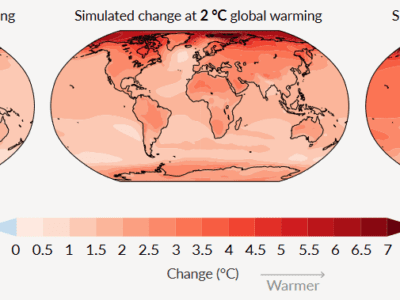The environmental community mourns the passing of climate science giant Stephen Schneider
Dr. Stephen Schneider, the pioneering Stanford climate scientist whose passion for the topic and concern for the earth’s future led him to become an outspoken public advocate for the role of scientific evidence and scientific judgment in shaping climate policy, has died at age 65 of an apparent heart attack.
Andy Revkin of the New York Times, Ben Santer of Lawrence Livermore Laboratories (at Real Climate), and Stanford University have published obituaries or appreciations of Dr. Schneider.
Stanford Magazine had just published an interview with Dr. Schneider online, in which he discussed Climategate, climate-science journalism, and the limits of scientific knowledge. Although was often caricatured among climate deniers and on the political right, he had a sound understanding of the role of science in public discourse, as he demonstrated in this excerpt from the interview:
In climate science, or any other complex system, there’s no single best answer because there are multiple possibilities with different likelihoods. So what honest scientists do is frame the problem as a bell curve.
We know we have a rough 10 percent chance that [the effect of global warming] is going to be not much; a rough 10 percent chance of ‘Oh, My God’; and everything else in between. Therefore, what you’re talking about as a scientist is risk: what can happen multiplied times the odds of it happening. That’s an expert judgment. The average person is not really competent to make such a judgment.
But then there’s risk management. What do we do about it? How do we deploy scarce resources in society to deal with climate vs. health, vs. housing, vs. global development? And the answer is, that’s not a science judgment. That’s a value judgment. And that value judgment can only be made well if you understand the what-can-happen, what-are-the-odds part.
So what I’m trying to do is get media and the political world to stop framing climate change in “either/or” terms, when we’re really looking at a bell curve of possibilities. It’s like buying insurance. How much of your family income do you want to spend on insurance? The more insurance you have, the safer you are if the house burns down or you get sick. But if the premium is more than you earn, you can’t pay it. I keep using these metaphors to try to make people understand this is just like managing risk in our personal lives. But climate risks occur at the level of the planet, where there is no management other than agreements among willing countries.
Scientists have traditionally been reluctant to engage with the public, and Dr. Schneider was a strong believer that this was a mistake. He dedicated significant time and energy to encouraging direct communication between scientists and the public about the work of science, and about climate science in particular. It would be a serious understatement to say his work, both as a scientist and as a communicator, has been influential.
I did not know Dr. Schneider well, but was fortunate to meet him a few times (including at one conference at which my task, in part, was to synthesize and comment on the remarks of several other speakers, including him). His presentations about the state of climate change science were always eloquent and persuasive. He was truly a giant among speakers on the subject, coupling his broad knowledge with heartfelt passion, and infusing wit and humor into even the most dismal topics.
Reader Comments
One Reply to “The environmental community mourns the passing of climate science giant Stephen Schneider”
Comments are closed.






Smart, funny, sarcastic and skeptical, Stephen Schneider contributed to our understanding of climate change as a pioneer in interdisciplinary climate research and with his remarkable ability to communicate. His death yesterday is a great loss on both accounts.
He founded the journal Climatic Change in 1971 and contributed to all four Intergovernmental Panel on Climate Change (IPCC) reports. In his research he considered the effects of aerosols on climate and developed climate models. Recently he focused on the challenge of making important policy decisions in the face of uncertainty. In this video, Cancer and Climate Change: Parallels in Risk Management he explains how he put his theories to the test, using climate change policy and his choices about his own cancer treatment as examples:http://www.youtube.com/watch?v=gyJjWapPGfQ
His web page http://stephenschneider.stanford.edu/ includes links to his writing.